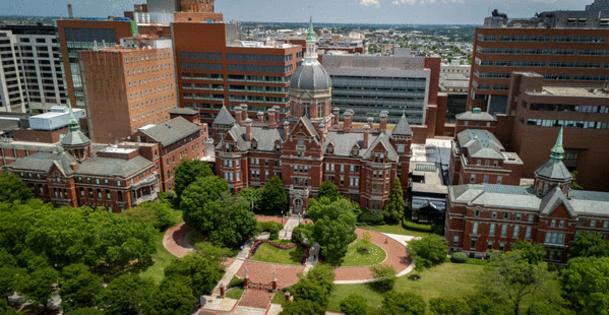Some Johns Hopkins, UMD research stopped after Trump cuts. Others are scrambling to resume
Published in News & Features
BALTIMORE — Some Maryland university research projects on the Trump administration’s chopping block have been fully discontinued, while others are scrambling to resume after a pause in funding.
Johns Hopkins has lost more than $800 million in federal grant money. The University of Maryland lost tens of millions of dollars. But some cuts have been blocked by legal challenges, though litigation is ongoing. Researchers describe disappointment and uncertainty as they determine how to move forward.
Alternative funding has been secured for a clinical trial in Bangladesh aimed at managing life-threatening diarrheal diseases in children, which was previously halted because of U.S. Agency for International Development funding cuts. The work has yet to resume.
“It just takes a long time to rebuild the teams and get things in place again to start,” said Judd Walson, chair of the Department of International Health at Johns Hopkins University, which partnered on the project. “The disruptions that are happening are really catastrophic.”
Over the past several weeks, 17 NIH awards have been terminated or had an unclear status, including two training awards supporting doctoral-level researchers, Walson said.
“We’re not getting a lot of communication, so it’s a little bit hard to say exactly what the status of some of these awards are,” he said.
The National Institutes of Health didn’t respond to questions about funding cuts to Maryland research institutions. In a lawsuit challenging NIH research cuts, lawyers for the federal government wrote in a recent court filing that its terminations of grants for DEI-related studies were “sufficiently reasoned,” and that the NIH has “broad discretion” to decide what grants to provide.
Johns Hopkins is a plaintiff in two lawsuits involving caps on reimbursement of indirect costs for research — one challenging the NIH and the other against the Department of Defense. The latter suit also lists the University of Maryland, College Park, as a plaintiff. Both schools have also filed a brief in support of a lawsuit filed by Harvard University against the Trump administration’s funding cuts.
New grant terminations have been arriving “nearly every week,” Johns Hopkins University said in a recent update published on its website. There’s also been a nearly two-thirds decrease in new awards compared with last year, the university said.
Johns Hopkins atmosphere and ocean sciences researcher Darryn Waugh was disappointed upon receiving notice that his NASA grant to study air pollution in Baltimore was canceled by the Trump administration.
The termination came as a result of President Donald Trump’s executive order, “Ending Radical and Wasteful Government DEI Programs and Preferencing.”
“It wasn’t clear to me that this actually falls under this diversity, equity, inclusion,” Waugh said. “It was research that I think we still wanted to do — to understand how the air pollution varies through the city — and the environmental justice was only actually a relatively small component of it.”
Waugh was working through the second year of a three-year grant, totaling $1,465,950.
“We’ve got kind of a preliminary analysis,” he said, regarding the research. “But to get anything conclusive, we would need more than one year of funding.” Waugh said he intends to find ways of continuing the research without the NASA grant.
Daniel Mullins, at the University of Maryland School of Pharmacy, had a grant canceled for a “Health Equity Research Hub,” which examined how to encourage greater participation in health-related research.
Mullins said the loss of the grant affected five positions, and the individuals will be removed from the university because of lack of funding. He added that the termination stated that the grant was DEI-related, which he disputes.
“I think under the DEI umbrella, a lot of times, the government will refer to it as just one racial ethnic group,” he said. “We’ve worked in different geographies, in different racial and ethnic populations, but what’s cool about what we do is it really does apply to all patients in all populations.”
Mullins said his research group has additional funding from other agencies and is writing new proposals.
Walson said social determinants of health — involving factors like poverty and other “inequities” — are “foundational to our understanding of health.”
“So the idea that we would not be able to pursue work that focuses on identifying and managing those particular issues, which are the underlying, core issues at the heart of health issues, is really challenging,” Walson said.
The Trump administration’s cuts have had an ieffect across the world. Walson said it’s estimated the cuts will result in hundreds of thousands of deaths globally, and could eventually lead to millions of deaths over the next couple of years.
Secretary of State Marco Rubio has said it’s “a lie” that people have died because of USAID cuts. During a congressional hearing in May, Rubio said the U.S. is the world’s “largest humanitarian provider.”
“I would argue: How many people die because China hasn’t done it?” he said. “How many people have died because the U.K. has cut back on spending and so has other countries?”
©2025 Baltimore Sun. Visit baltimoresun.com. Distributed by Tribune Content Agency, LLC.







Comments